Kabul bomb: Diplomatic zone attack kills dozens
BBC
A powerful vehicle bomb has hit the diplomatic area of the Afghan capital, Kabul, killing at least 80 people and injuring 350.
It struck near Zanbaq Square in the heavily fortified zone, with civilians said to be the main casualties.
The morning rush-hour blast was so strong it blew out windows and doors hundreds of metres away.
The Taliban have denied carrying out the attack. There has been no word so far from so-called Islamic State.
Both groups have been behind recent attacks in the country.
The BBC has said that Mohammed Nazir, a driver for the corporation’s Afghan service, died in the explosion.
When and where did the attack take place?
The bomb went off at about 08:25 local time (03:55 GMT) during rush hour at the diplomatic quarter.
Makeshift ambulances carried wounded away from the scene, as frantic relatives gathered both at the cordoned-off perimeter of the blast site and later at hospitals to try to locate loved ones.
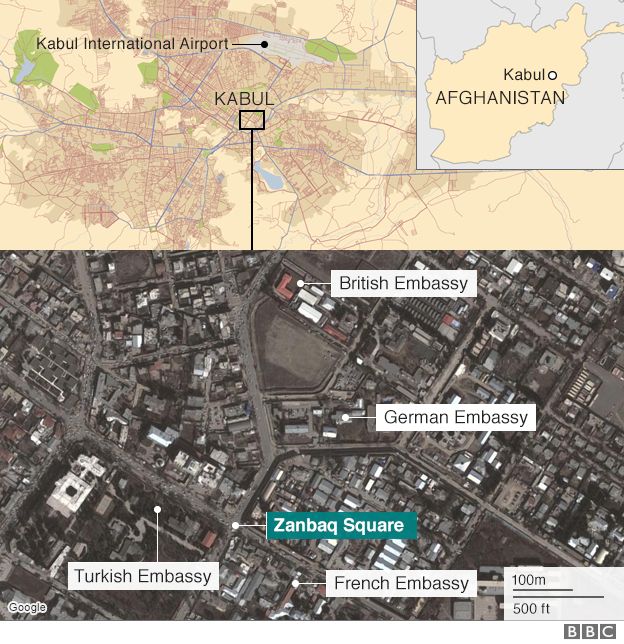 Images showed dozens of blackened and burned out cars. More than 50 vehicles were destroyed.
Images showed dozens of blackened and burned out cars. More than 50 vehicles were destroyed.
Basir Mujahid a spokesman for Kabul police, told Reuters news agency the explosion had taken place close to the German embassy but added it was “hard to say what the exact target is”.
There are many other key buildings in the area, including the presidential palace and a number of embassies, including the British.
Some reports say the bomb was in a lorry or water tanker.
The BBC’s Harun Najafizada in Kabul says questions are already being asked about how the vehicle could have penetrated such a heavily fortified area, with its 3m (10ft) high blast walls, to carry out the deadliest attack in the capital in years.
Who were the casualties?
Initial reports suggest civilians bore the brunt of the casualties.
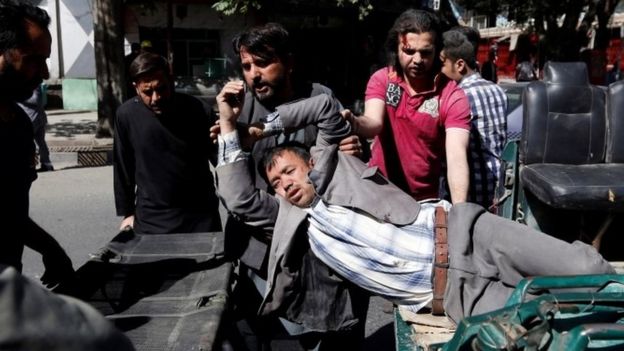 REUTERS – Makeshift ambulances carried people away from the scene
REUTERS – Makeshift ambulances carried people away from the scene
The health ministry said the casualty figures were expected to rise further.
Spokesman Ismael Kawoosi said: “They are still bringing bodies and wounded people to hospitals.”
The interior ministry has called on residents to donate blood, saying there was a “dire need”.
One local shop owner, Sayed Rahman, told Reuters his store was badly damaged, adding: “I have never seen such a terrible explosion in my life.”
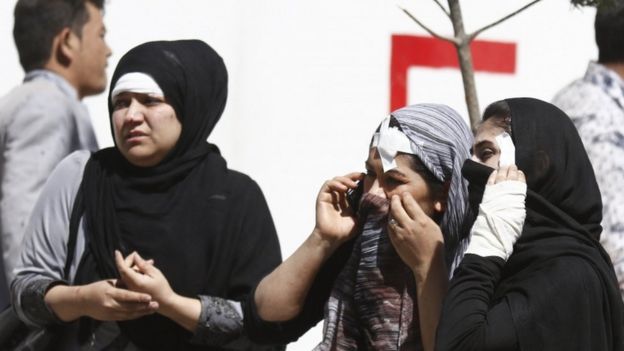 EPA – Anxious relatives gathered near the blast site
EPA – Anxious relatives gathered near the blast site
Another resident, Abdul Wahid, told the BBC the blast “was like a heavy earthquake”.
Several international and local sources have been reporting on casualties:
- Mohammed Nazir, who worked as a driver for BBC Afghan for more than four years, died in the blast, the BBC confirmed, adding that four of his colleagues were injured. Their injuries are not thought to be life threatening
- German Foreign Minister Sigmar Gabriel said employees at the German embassy had been injured and one Afghan security guard had died
- French officials said the country’s embassy had been damaged but no French casualties reported
- The British embassy said all its staff were accounted for
- Indian Foreign Minister Sushma Swaraj said the staff of its embassy were safe
- Two Japanese embassy staff members were slightly wounded
- Turkey said its embassy was damaged but no-one was hurt
- Afghanistan’s Tolo news agency tweeted that one of its staff members, Aziz Navin, had died
- A Tolo journalist also said some of the victims were from the Roshan mobile phone company, but this has not been confirmed
What has the reaction been?
Afghan President Ashraf Ghani said he “strongly condemned the cowardly attack in the holy month of Ramadan targeting innocent civilians in their daily life”.
Germany’s Sigmar Gabriel called the attack “contemptible”.
Indian PM Narendra Modi also tweeted his condemnation, saying: “Our thoughts are with the families of the deceased & prayers with the injured.”
A Pakistani Foreign Office statement denounced the attack, saying: “Pakistan, being a victim of terrorism, understands the pain and agony that such incidents inflict upon people and society.”
Who could have been behind the attack?
The Taliban and the so-called Islamic State in Afghanistan are the main suspects.
However, the Taliban quickly issued a statement denying involvement.
Spokesman Zabihullah Mujahid said the group condemned untargeted attacks that caused civilian casualties.
Afghanistan’s IS said it was behind a suicide bomb attack this month on a Nato convoy that was passing the US embassy in Kabul. At least eight civilians were killed.
It has made no comment so far on the latest attack.
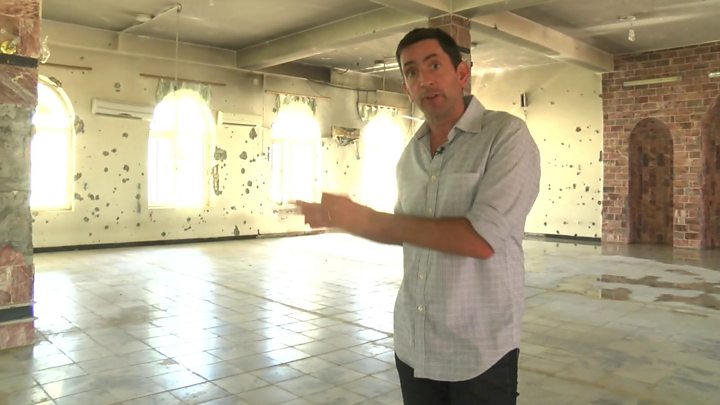 The BBC’s Justin Rowlatt visited the site of April’s Mazar-e Sharif Taliban attack
The BBC’s Justin Rowlatt visited the site of April’s Mazar-e Sharif Taliban attack
When announcing the start of their major spring offensive last month, the Taliban said their main focus would be foreign forces, targeting them with a mix of conventional, guerrilla, insider and suicide attacks.
The US has about 8,400 troops in Afghanistan, with another 5,000 from Nato allies.
The Pentagon has reportedly pressed President Donald Trump to send thousands more troops back to the country to try to counter gains by the Taliban. More than a third of the country is now said to be outside Afghan government control.
A Taliban attack on an Afghan army training compound in the northern city of Mazar-e Sharif last month killed at least 135 soldiers, and led to the resignation of the defence minister and army chief of staff.
Major recent Kabul attacks
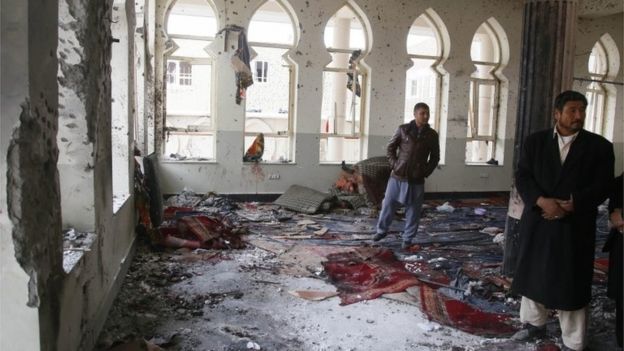 EPA – Aftermath of the Baqir ul Olum mosque attack in November 2016
EPA – Aftermath of the Baqir ul Olum mosque attack in November 2016
- 8 March 2017 – More than 30 people killed after attackers dressed as doctors stormed Sardar Daud Khan military hospital
- 21 Nov 2016 – At least 27 dead in a suicide bomb attack on Baqir ul Olum mosque during a Shia ceremony
- 23 July 2016 – At least 80 people killed in twin bomb blasts targeting a rally by the Shia Hazara minority in Deh Mazang square
- 19 Apr 2016 – At least 28 dead in a huge explosion close to the Afghan defence ministry building
- 1 Feb 2016 – 20 killed in a suicide bomb attack at police headquarters
- 7 Aug 2015 – At least 35 people dead in separate bomb attacks across the capital
